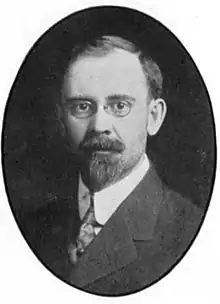Wilbur Marshall Urban
Wilbur Marshall Urban (March 27, 1873–October 15, 1952) was an American philosopher of language, influenced by Ernst Cassirer.[1] He wrote also on religion, axiology,[2] ethics and idealism.[3]
Wilbur Marshall Urban | |
|---|---|
 | |
| Born | March 27, 1873 |
| Died | October 15, 1952 (aged 79) |
| Spouse | Elizabeth Newell Wakelin |
| Era | 20th-century philosophy |
| Region | Western philosophy |
| Institutions | |
Biography
Urban was born at on March 27, 1873 Mount Joy, Pennsylvania,[4] to the Rev. Abraham Linwood Urban and Emma Louisa (Trexler) Urban.[5]
Philosophy
His Language and Reality, besides its exposition of Cassirer's ideas, has been described as the work “that first introduced Husserl’s phenomenology to the English speaking world”.[6] It began with the words “Language is the last and deepest problem for the philosophic mind.”
He was Stone Professor of Philosophy at Dartmouth College, from 1920 to 1931,[7] and President of the American Philosophical Association in 1925-6.[8] He was then a professor at Yale University, succeeded in 1941 by Cassirer.[9]
He was a critic of Alfred North Whitehead,[10] and of Paul Tillich.
In literary criticism
Cleanth Brooks, in The Well Wrought Urn (1947),[11] gave extended attention to Urban's views on language and symbolism, as applied to poetry. Suzanne Langer, however, starting from a similar base in Cassirer's thought, had criticized what Urban had to say in detail on poetry, in Philosophy in a New Key (1942).[12] These matters are discussed in Cleanth Brooks and William K. Wimsatt, Literary Criticism: A Short History (1957).[13]
Works
- The Problem of a "Logic of the Emotions" and Affective Memory (1901)
- Definition and Analysis of the Consciousness of Value (1907)
- Valuation: Its Nature and Laws, Being an Introduction to the General Theory of Value (1909)
- Ontological Problems of Value (1917)
- The Intelligible World: Metaphysics and Value (1929)
- The Philosophy of Language (1929)
- The Church and Modern Thought: The Cure of Modern Souls (1931)
- The Church and the Modern World: The New Erastianism (1935)
- Language and Reality: The Philosophy of Language and the Principles of Symbolism (1939)
- Fundamentals of Ethics: An Introduction to Moral Philosophy (1945)
- Beyond Realism and Idealism (1949)
- Humanity and Deity (1951)
Notes
- Liukkonen, Petri. "Ernst Cassirer". Books and Writers (kirjasto.sci.fi). Finland: Kuusankoski Public Library. Archived from the original on 3 July 2007.
- "Axiological idealism is a name referring to such philosophies as those of Wilbur M. Urban (1873-1952) and others who have developed Idealistic theories of value and valuation."
- "Philosophers such as William James, Josiah Royce, William E. Hocking, and Wilbur M. Urban have represented an idealist tradition in interpreting religion, stressing the concepts of purpose, value, and meaning as essential for understanding the nature of God."
- Passport application Roll #: 451; Volume #: Roll 451 - 11 Jul 1895-19 Jul 1895
- Presidential Addresses of the American Philosophical Association, 1921-1930, edited by Richard T. Hall, Dordrecht/Boston/London, 1999, p. 265.
- International Communicology Institute Archived 2007-07-04 at the Wayback Machine
- American Professors of Philosophy and Theology Archived 2007-08-14 at the Wayback Machine
- APA Presidents Archived 2008-08-20 at the Wayback Machine
- (in Chinese) Foreign languages in Guangxi Archived 2007-09-27 at the Wayback Machine
- In Chapter 11 and Appendix 2.
- p. 231, 261.
- pp. 701–2.
External links
- (in Spanish) Biography
- The Intelligible World Manuscript at Dartmouth College Library